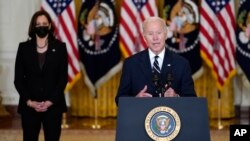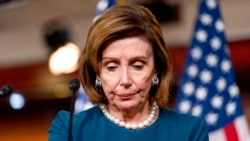U.S. President Joe Biden on Thursday unveiled a $1.85 trillion spending plan he said would provide the "most transformative" aid to American families in decades and, at the same time, set the United States on a path toward sharply cutting its greenhouse gas pollution.
Biden laid out the plan — about half the amount he had proposed weeks ago — in an early morning meeting with Democratic lawmakers in Congress, and then lobbied for it in a 23-minute White House address.
"Nobody got everything they wanted, including me," Biden said. "It's called compromise." He described the spending proposals, even in their pared-down shape, as "historic investments in our nation and our people."
Shortly after speaking, Biden and first lady Jill Biden boarded Air Force One for a trip to Europe. Their agenda includes an audience with Pope Francis at the Vatican. In the coming days, the president will meet in nearby Rome with world leaders about the global economy and then head to Glasgow, Scotland, for a summit on climate change.
Biden told Democratic lawmakers that the shrunken plan was the product of intense negotiations with a broad swath of politically progressive and moderate Democrats in Congress.
Biden specifically cited his back-and-forth talks with two centrist lawmakers who had objected to the $3.5 trillion price tag and several provisions of his original proposal: Senators Joe Manchin of West Virginia and Kyrsten Sinema of Arizona.
"President Biden is confident this is a framework that can pass both houses of Congress, and he looks forward to signing it into law," the White House said.
It was not immediately clear whether the warring factions of Democrats in Congress were on board with the White House claim that the curtailed plan could pass, along with a separate $1.2 trillion infrastructure proposal to rebuild the country's deteriorating roads and bridges and expand broadband service throughout the United States.
Speaker Nancy Pelosi, leader of the Democratic-controlled House of Representatives, was planning a vote later Thursday on the infrastructure legislation. That plan was postponed, replaced by a plan to vote on short-term funding for transportation programs.
Progressive Democrats have for weeks blocked passage of the measure, already approved by the Senate in a bipartisan vote, to retain leverage to include funding for their favored programs in the social safety net measure.
One of the progressives, Senator Bernie Sanders of Vermont, called the latest Biden plan "a major step" but added, "I want to see it improved."
In the politically divided Senate, all Republicans oppose the Biden social safety net and pollution-control legislation. The Democrats will need all 50 of their lawmakers, along with the tiebreaking vote of Vice President Kamala Harris, to pass the measure. They can afford to lose only a handful of Democratic votes in the House.
The latest Biden plan would provide universal prekindergarten schooling for all 3- and 4-year-old children in the country, but an original Biden call for two years of tuition-free community college education for high school graduates was jettisoned as too costly. Scholarship grants for needy college students would be increased, however.
The White House said the plan would save "most working families more than half of their spending on child care."
"For decades, child care prices in the United States have risen faster than family incomes," the White House said, "yet the United States still invests 28 times less than its competitors on helping families afford high-quality care for toddlers."
The White House also said the measure would extend for a year child tax credits for all but the wealthiest families in the U.S., but that was a cutback from Biden's original proposal to extend the tax break until at least 2025.
In addition, the White House said the government would increase spending for "affordable, high-quality care for older Americans and people with disabilities in their homes" and increase pay for caregivers.
Health care benefits would be improved, to a degree, with spending for hearing aids for older Americans added to the country's long-standing Medicare health insurance program, but not for the dental and vision care for elders that Biden originally wanted.
On pollution, the White House called Biden's plan "the largest effort to combat the climate crisis in American history."
It said $555 billion in new spending would cut a billion metric tons of greenhouse gas emissions by 2030, at least 10 times more than in any previous legislation approved by Congress.
Biden especially wanted this plank included in the proposal as he meets world leaders at the Glasgow climate summit early next week.
The White House said the $1.85 trillion plan would be fully paid for with increased taxation on the wealthiest two-tenths of 1% of Americans — multimillionaires and billionaires.
A 15% minimum tax on profits would be levied on some of the largest companies in the U.S., those with $1 billion or more in profits, and there would be ramped up enforcement against tax cheats by agents at the country's tax collection agency, the Internal Revenue Service.





